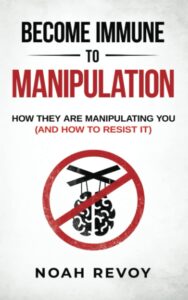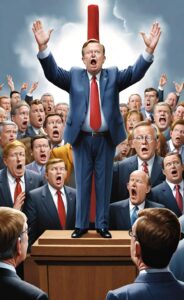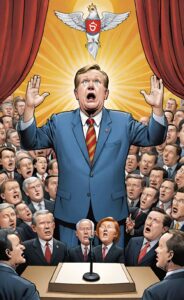In the political realm, it’s not uncommon for individuals to develop strong attachments to their preferred politicians. However, when admiration becomes worship, it raises concerns about a dangerous trend that seems prevalent among those who may not possess the highest intellectual capacities. This is not an indictment on these individuals, but rather a call to encourage critical thinking over blind allegiance.
The Danger of Blind Allegiance to Politicians
There’s an inherent danger when individuals put on blinders and pledge unfettered loyalty to their chosen political leaders. Regardless of the IQ level, this poses a problem that’s not only personal but societal in nature. However, the issue takes a heightened form when seen in the context of normie individuals, due to their potential vulnerability to manipulation and misinformation. As they become zealous followers, they start accepting political narratives at face value, without questioning the authenticity or intent behind them.
In the political arena, this translates into an uncritical acceptance of a politician’s decisions, regardless of their potential consequences. Even significant errors or ethical missteps by politicians may go unnoticed or ignored by these devoted followers. When this devotion morphs into something akin to religious worship, it exacerbates the problem, creating a population segment that’s less informed, less critical, and potentially more susceptible to populist demagoguery.
While loyalty to a leader is not inherently harmful, it’s crucial to maintain a sense of balance and skepticism. Blind allegiance eliminates this balance, leaving room for potential exploitation and manipulation. The ramifications of this can be far-reaching, potentially leading to societal decisions that are not in the best interest of the people or the nation. Unfortunately, those with lower critical thinking skills may be particularly susceptible to falling into this trap. As such, it’s crucial to promote awareness of this issue and advocate for the importance of critical thinking in political discourse.
Illusion of a Savior in a Political Figure
There exists a prevalent notion among those who unabashedly worship politicians, particularly among mainstream media watchers, that a single political figure holds the solution to all societal problems. This is not only unrealistic but also hazardous. This misguided belief, often amplified by a politician’s charismatic personality and lofty promises, is tantamount to attributing a messiah-like status to them.
When a person invests unwavering faith in one politician, they often dismiss the essential democratic principle of checks and balances. They forget that the sound functioning of a government isn’t dependent on a single person, but on a balanced system of power distribution. This belief system can be further reinforced by captivating speeches and carefully crafted political narratives that play into their existing ideologies and perceptions.
The downside is that this leaves little room for questioning the actions of these political figures, thereby undermining the process. As such, it is important to debunk the myth of a political savior and educate the public about the complex, collaborative nature of politics and governance.
Trapped in an Echo Chamber of Political Ideology
A common consequence of politician worship is the entrapment of individuals within an echo chamber of political ideology. This phenomenon forms a loop of self-confirmation, continuously reinforcing and strengthening their existing beliefs. For individuals with lower IQs, breaking free from this echo chamber can be an uphill battle due to their struggles with critical thinking or lack of exposure to alternative perspectives.
It’s a bubble that amplifies their political convictions, while muffling voices of dissent or different viewpoints. The danger lies in the fact that this echo chamber not only intensifies political polarization but can also obstruct societal progress and unity. It creates a narrow, one-sided understanding of political realities that can be skewed, biased, and far from the comprehensive picture.
Diverse political discourse is essential for a healthy community, but an echo chamber restricts this diversity, leaving those trapped inside it less informed, more polarized, and less able to contribute effectively to societies decision-making. Therefore, it’s crucial to make efforts towards promoting political literacy and exposure to a variety of perspectives, to help dismantle these ideological echo chambers.

> Check Current Book Prices <
Risks of Sacrificing Personal Values for Political Beliefs
The trend of politician worship can often lead individuals to conflate their personal values with the political rhetoric they are subjected to, resulting in the potential abandonment of deeply held principles in favor of political loyalties. It is distressing to observe individuals renouncing their individual beliefs and moral codes to align themselves with the stance of a political figure they admire.
In this process, they may end up endorsing and propagating views and actions that contradict their original values, which can have a ripple effect on the societal fabric. This doesn’t just impact the individuals themselves, but also extends to the larger community they influence. The intertwining of political beliefs and personal values might seem harmless on the surface, but its ramifications are substantial. This mix-up can result in the erosion of essential human values, replaced by partisan interests and loyalty towards a political figure.
In severe cases, this can even contribute to the normalization of censorship, genocide, or other unethical practices, as long as they are propagated by the worshipped political figure. It is, therefore, paramount to acknowledge and address this unsettling tendency, to preserve the sanctity of personal values and ensure they don’t become mere casualties in the arena of political worship.



The Long-Term Consequences of Politician Worship
The implications of politician worship extend beyond the immediate present, laying the groundwork for long-standing negative impacts. This can manifest as increased societal divisions and fluctuating political stability, both of which can hinder a nation’s progress and prosperity. A disturbing facet of this phenomenon is how it can be leveraged by opportunistic leaders and those hiding at the end of the puppet strings.
By tapping into the unshakeable faith of their worshippers, they can propagate unchecked narratives and make decisions that may not align with the best interest of the public. This presents a unique risk for individuals who worship statism, who may not question the validity of these decisions or the underlying motives. This exploitative dynamic fosters an environment conducive to misinformation, creating a perpetuating cycle that fuels the fire of politician worship. This not only hinders the democratic process but can also lead to a distortion of societal values over time, leaving a lasting scar on the societal psyche.
The ripple effect of such consequences can be substantial, affecting the trajectory of a nation’s development and the well-being of its people. Hence, it’s necessary to acknowledge these potential outcomes and work towards fostering a more balanced and critical approach towards political figures and their actions. This will ensure the safeguarding of values and principles, preventing any long-lasting detrimental impacts of politician worship.
The Power of Critical Thinking and Independent Opinion
Cultivating critical thinking and fostering independent opinions can provide a formidable counter to the pervasive trend of political idolatry. Individuals across the IQ spectrum have the inherent capacity to question, assess, and form distinct viewpoints.
Harnessing these abilities can disrupt the cycle of political hero-worship and contribute to an electorate that is not only more informed but also actively engaged. This shift can nurture a societal ethos that places higher value on logical discourse as opposed to unquestioning devotion, and advances the cause of politicians who are dedicated to genuinely serving their constituents over those with mere aspirations of power and domination.
Fostering such an environment can eventually lead to a healthier political landscape that is resilient against manipulation and exploitation, and instead encourages transparency, accountability, and constructive political discourse. Ultimately, the promotion of critical thinking and independent opinion formation can function as potent tools to prevent the detrimental consequences of politician worship.






